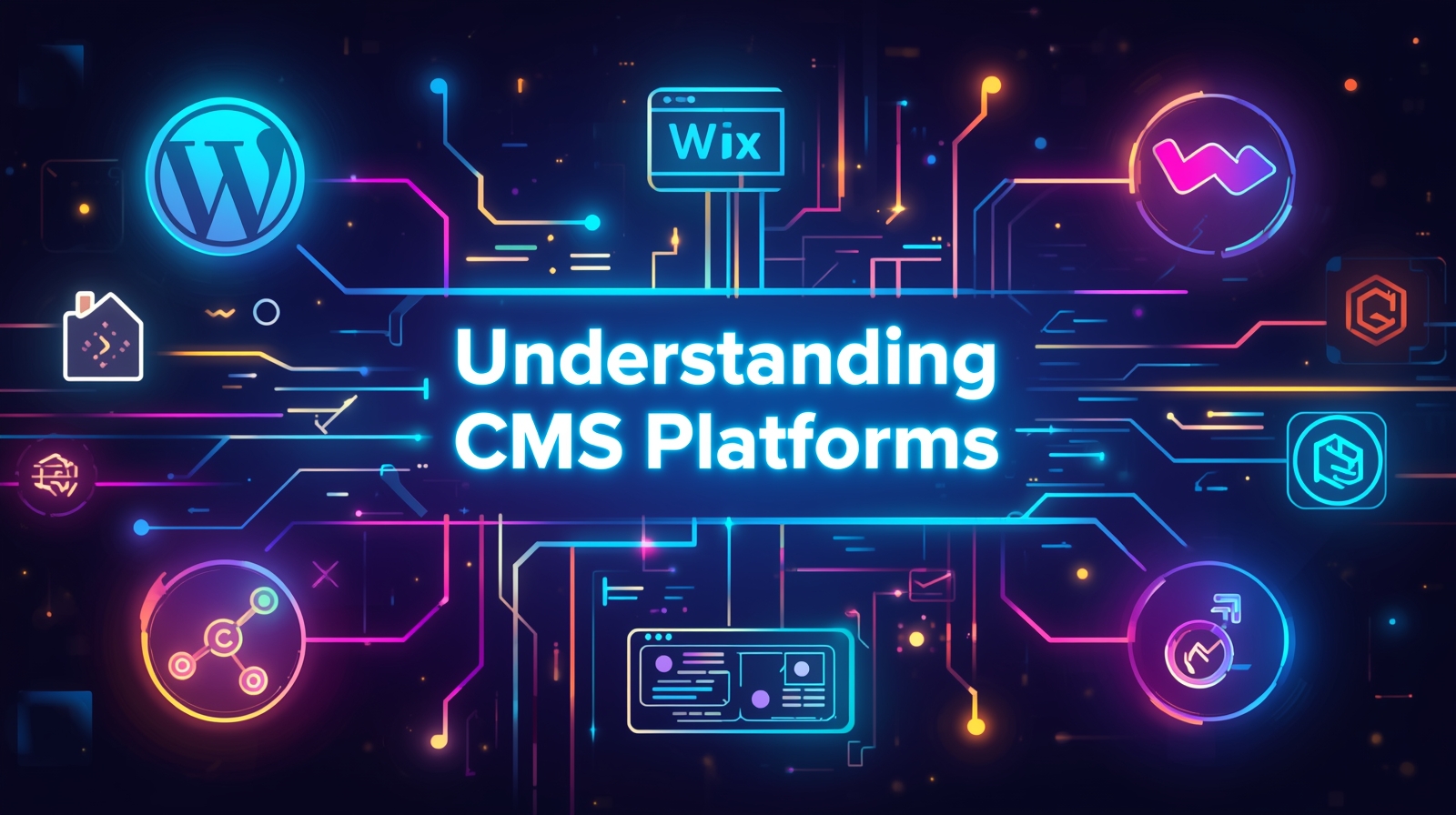Understanding CMS Platforms: WordPress, Shopify, Webflow & More
In the digital world, choosing the right Content Management System (CMS) can define the future success of your website. Whether you’re planning an eCommerce store, a blogging website, a portfolio, or a business website, Understanding CMS Platforms is essential for making informed decisions that support scalability, revenue, and user experience.
Modern CMS platforms such as WordPress, Shopify, Webflow, Wix, Magento, and Drupal offer powerful tools—each built for different needs. This blog will help you to Understand CMS Platforms so you can pick the best one for your business goals.
What Is a CMS and Why Does It Matter?
A CMS (Content Management System) allows you to build, manage, and edit a website without writing code. When you focus on Understanding CMS Platforms, you begin to see how each platform affects:
- Website speed
- SEO performance
- Customization
- Security
- Scalability
- Cost and maintenance
Businesses that invest time in Understanding CMS Platforms build websites that load faster, convert better, and scale effectively.
WordPress – The Most Popular CMS Worldwide
WordPress powers more than 43% of all websites. When Understanding CMS Platforms, WordPress is often the first name that appears.
Why WordPress Is a Strong Choice
- 100% customizable
- Thousands of themes and plugins
- SEO-friendly structure
- Affordable and scalable
- Best for blogs, business sites, portfolio, eCommerce (via WooCommerce)
If you’re Understanding CMS Platforms for long-term growth, WordPress offers unmatched flexibility.
Shopify – The Best for eCommerce
Shopify is one of the most powerful eCommerce CMS platforms. For brands selling products online, Understand CMS Platforms like Shopify can help you choose the best system for seamless online selling.
Why Shopify Stands Out
- Built-in payment gateway
- Secure and stable hosting
- Easy to manage products
- Inventory and order management
- Best for eCommerce start-ups and big brands
When Understanding CMS Platforms, Shopify is ideal for online stores who want performance without technical hassle.
Webflow – Modern, Visual, No-Code Design Power
Webflow is a rising star for businesses wanting visually stunning websites. If you Understand CMS Platforms for aesthetic, smooth, modern websites—Webflow is a top choice.
Webflow Advantages
- No-code visual builder
- Full design freedom
- Great for animations and modern UI
- Built-in hosting
- Better speed and clean code
Agencies prefer Webflow because it combines design flexibility with strong performance.
Wix – Simple, Beginner-Friendly Website Builder
Wix is ideal for small businesses and beginners. Wix appeals to users who want simplicity.
Why You Might Choose Wix
- Drag-and-drop design
- Affordable
- Easy to use
- Pre-built templates
Although not as powerful as WordPress or Webflow, it’s suitable for small websites.
Magento – Best for Large and Advanced eCommerce
Magento (now Adobe Commerce) is for enterprise-grade online stores. If your goal is to Understand CMS Platforms includes handling large-scale eCommerce, Magento is unbeatable.
Magento Features
- Highly customizable
- Advanced product handling
- Great for big brands
- Requires technical knowledge
Large companies benefit greatly from Magento’s deep customization.
Drupal – The Most Secure CMS
If security is your priority, Understanding CMS Platforms leads you to Drupal.
Drupal Benefits
- Extremely secure
- Highly customizable
- Good for government or high-security sites
It’s powerful but requires technical skills.
Choosing the Right CMS for Your Business
When Understand CMS Platforms, ask these questions:
Key Factors to Consider
- Your business type (blog, eCommerce, portfolio, corporate)
- Budget
- Need for custom design
- Scalability
- Security requirements
- SEO goals
- Maintenance capability
A business that spends time makes decisions that save money and boost performance for years.
Comparison Table – Quick CMS Breakdown
| CMS | Best For | Difficulty | Customization | Cost | SEO |
| WordPress | Blogs/Business Sites | Medium | High | Low | Excellent |
| Shopify | eCommerce | Easy | Medium | Medium-High | Good |
| Webflow | Creative/Agency Sites | Medium | Very High | Medium | Excellent |
| Wix | Beginners/Small Sites | Very Easy | Medium | Low | Good |
| Magento | Large eCommerce | Hard | Very High | High | Excellent |
| WordPress | Blogs/Business Sites | Medium | High | Low | Excellent |
This table helps you in Understanding CMS Platforms briefly.
Why Understanding CMS Platforms Matters for SEO & Growth
A good CMS makes a huge difference in:
- Speed
- User experience
- Mobile responsiveness
- Conversion rates
- SEO rankings
- Content management
Companies that invest in Understanding CMS Platforms build digital experiences that outperform their competitors.
Conclusion
Choosing the right CMS is not just a technical decision—it affects your brand, marketing, and long-term business growth. The more you focus on Understanding CMS Platforms, the better your website will perform across all metrics: speed, SEO, user experience, and conversions.
By exploring WordPress, Shopify, Webflow, Wix, Magento, and Drupal, you can select the CMS that aligns with your business goals.
FAQs
- What is a CMS platform?
A CMS is a tool that lets you build and manage a website without writing code. It simplifies editing, publishing, and updating content.
- Which CMS is best for beginners?
Wix and WordPress are great for beginners due to easy interfaces and flexibility.
- Is Shopify better than WordPress for eCommerce?
Shopify is easier and built specifically for eCommerce, while WordPress (WooCommerce) offers more customization.
- Why should businesses understand CMS platforms?
Understanding CMS platforms helps choose the right technology, improving performance, SEO, and customer experience.
- Which CMS is best for a fast-loading website?
Webflow and WordPress (with optimized hosting) offer excellent performance and speed.




